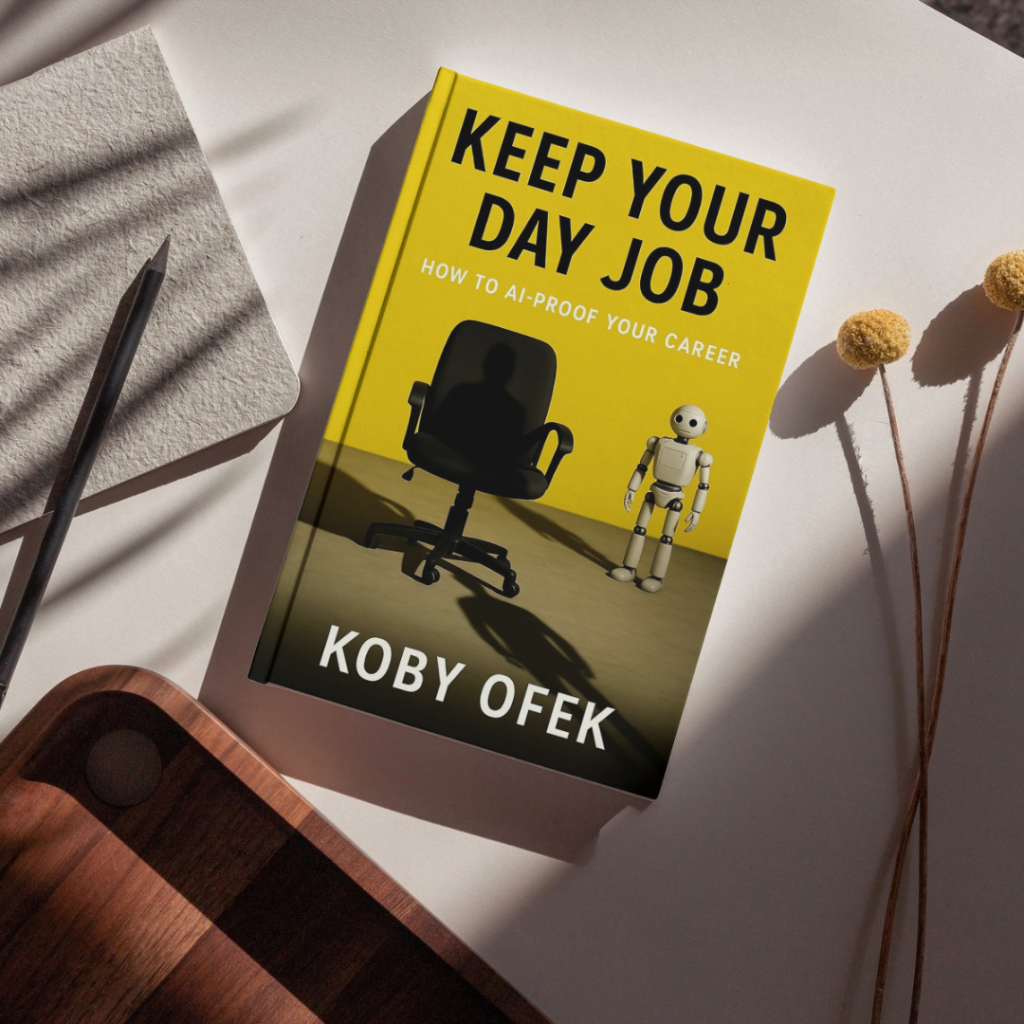The current AI zeitgeist feels a bit like the early days of the internet, if the internet also threatened to automate your therapist, your accountant, and possibly your golden retriever’s uncanny ability to know when you’re reaching for the treat bag. Every week, another headline screams about a new AI model that can write symphonies, diagnose rare diseases, or generate photorealistic images of squirrels conquering Mars. It’s enough to make even the most Luddite-adjacent among us wonder if our résumés are about to become historical documents. Into this swirling vortex of progress and panic steps Koby Ofek with “Keep Your Day Job: How to AI-Proof Your Career,” a book that, refreshingly, aims to be less of a philosophical treatise and more of a practical field manual for the professionally perplexed.
Ofek’s central premise is stark and sensible: passively waiting for AI to reshape your career is “the riskiest move you can make”. Instead of stoking the flames of existential dread, the book champions proactive adaptation. It’s not about outrunning the algorithm – a fool’s errand if ever there was one – but about learning to dance with it, or at least strategically sidestep it. The book is packed with frameworks designed to help you dissect your current role and rebuild it with a more AI-resistant alloy.
Think of tools like “Task DNA”, which encourages you to break your job down into its constituent micro-tasks and assess each for “AI Replicability” versus its “Human Signature.” It’s a surprisingly effective way to get an “uncomfortable clarity,” as Ofek puts it , on which parts of your workday are already in the crosshairs of automation (the “Ghost Town”) and where your uniquely human skills still reign supreme (the “Moat”). Then there’s the “Skill Barbell Strategy”: load up one end with deep, hard-to-replicate human expertise (your “Heavy Human Plate”) and the other with essential AI fluency (the “Light AI Plate”), while ruthlessly shedding the “Flabby Middle” of generic, automatable tasks. It’s a compelling visual for a focused development plan. To make this tangible, Ofek introduces “AI Shadowing Sprints”, 90-minute human-vs-machine throwdowns on specific tasks, designed to quickly reveal where AI can assist and where it falls short.
This practical, toolkit-driven approach distinguishes “Keep Your Day Job” from many other AI-and-the-future-of-work books. While Kai-Fu Lee’s AI Superpowers offers a sweeping geopolitical view of the US-China AI race and its societal implications, and Klaus Schwab’s The Fourth Industrial Revolution paints a broad canvas of systemic change from a Davos-eye perspective, Ofek’s book is laser-focused on the individual professional. It’s less about the grand pronouncements and more about what you can do on Monday morning. Similarly, where Marco Iansiti and Karim Lakhani’s Competing in the Age of AI provides a roadmap for organizational transformation towards AI-centric models, Ofek is speaking directly to the employee navigating that redesigned firm.
The author, Koby Ofek, isn’t an academic theorist parachuting in with abstract notions. He’s a “serial entrepreneur, tech strategist, and AI educator” with a resume that includes being an ex-Googler from the founding team in Israel and launching ventures in edtech, media, and applied AI. He’s been at the “edge of disruption” for years, advising companies on AI strategy and workforce transformation. This street-level experience, combined with a Master’s in Philosophy , gives the book a pragmatic, “roll-up-your-sleeves” feel. He even built a language-learning app where AI tutors “sass you into fluency” – a man clearly comfortable making AI his, and our, slightly impertinent assistant.
However, no field manual is perfect, especially when the battlefield is evolving as rapidly as AI. One of the book’s strengths – its abundance of actionable frameworks – could also be a minor hurdle. For some readers, the sheer number of canvases, matrices, and sprints might feel like “toolkit overload,” a common critique of self-help literature that can sometimes make implementation feel daunting. A clearer roadmap on prioritizing or integrating these tools based on individual starting points might have been beneficial.
Additionally, while Ofek’s emphasis on individual agency is empowering, the relentless pace of AI development means some specific tech examples or tactical advice might age faster than a TikTok trend. The core principles of adaptation and focusing on human-centric skills are timeless, but the reader will need to remain a perpetual student to keep their “Light AI Plate” current. Finally, while the book does dedicate a chapter to the crucial “Mental Fitness for the Long Haul” and another to broader societal ethics and policy , the primary focus remains on individual action. Some might argue that the scale of AI’s societal impact necessitates a more profound discussion of systemic solutions beyond personal adaptation, though Ofek does open that door.
Despite these quibbles, “Keep Your Day Job” is a valuable addition to the AI survival library. It’s less about grand theory and more about practical application, offering a much-needed dose of agency in an era of uncertainty. It’s for anyone who has watched an AI demo and felt that familiar pang of “uh-oh.” Ofek’s message is ultimately optimistic: you can’t stop the AI wave, but you can learn to surf it. And in an economy where, as the book jacket rightly proclaims, “the smartest pivot wins”, this guide offers a compelling set of charts and a sturdy surfboard. It’s a pragmatic, intelligent, and surprisingly reassuring read for anyone trying to keep their head, and their job, above the algorithmic tide.
Discover more from Just Buzz
Subscribe to get the latest posts sent to your email.


